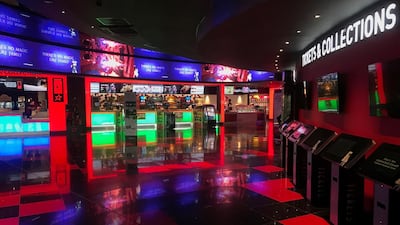With cinemas shut worldwide in the wake of the coronavirus pandemic and families indoors, there has, perhaps, never been a worse time to be a cinema owner. Reporting its 2019 year-end fiscal results, Cineworld, the world's second-biggest cinema chain with almost 10,000 screens in 11 countries, said that a two-month lockdown of all its sites could hurt its ability to meet its financial commitments. Independents are facing an even more uncertain time with rent to pay and no viable income source.
In theory, this is a temporary situation and we should all be flocking back into cinemas once the doors are open again. But could it be the beginning of a more permanent end to an already under-threat cinema-going experience, as audiences become increasingly accustomed to viewing at home in the digital age?
Since the beginning of the year, cinemas first closed in China, then across much of Europe and other parts of Asia, and now in the world's biggest market, the US. Unsurprisingly, with nowhere to screen them, big-ticket blockbusters such as the latest James Bond title, No Time to Die, and the live-action remake of Disney's Mulan have postponed their release dates. More worrying for cinema owners, however, is the decision of certain studios to move some less high-profile films straight to video-on-demand services in the absence of a definite idea of when cinemas may open again.
At first, this affected films that were already in cinemas, but had their box office run curtailed by the closures. On March 20, Disney announced that Pixar animation Onward would be released on streaming platforms for US viewers, only two weeks after its cinema release was halted. Later the same day, Universal shunted its three-week-old The Invisible Man straight to the web, along with the week-old political satire / survival romp The Hunt.
All of these decisions were perfectly understandable given the sudden lack of an audience. But at the same time as the Invisible Man announcement was declared, Universal made another announcement that would have rung alarm bells among exhibitors. The anticipated children's sequel Trolls World Tour, scheduled to be released on Monday, April 6, will instead be available through video-on-demand on this date.
It's not the first time a film has received a same-day release on the internet – Netflix has trialled this method with films including Beasts of No Nation and Roma, while Sony released the political comedy The Interview online on the same date as its cinema release.
It is, however, the first time a major traditional studio has done this entirely voluntarily. Streaming service Netflix reserves cinema releases for films it hopes to see at the Oscars, almost purely as a box-ticking exercise for qualification. An online release of The Interview, meanwhile, was forced on Sony because of death threats to cinemagoers and a hacking scandal engineered by peeved supporters of the film's main character, North Korean leader Kim Jong-un.
These are unprecedented times, and one studio's decision to go straight to video-on-demand cannot be taken in isolation as a sign of cinema's impending demise. No high-profile blockbusters have been rescheduled to head straight to homes yet – No Time to Die, Mulan and Warner Brothers' Wonder Woman 1984, for example, have all been merely delayed, so presumably the studios still value cinema releases for their biggest assets. Indeed, box office takings reached a global record of $42.5 billion (Dh156.1bn) last year, suggesting the industry is in rude health, although that does not tell the whole story.
While the 2019 box office sum was impressive, it was also, for the first time, less than global revenue from subscriptions for streaming services. Audiences worldwide spent $53bn on platforms such as Netflix and Amazon Prime last year.
Cinema’s ongoing battle with online alternatives is well publicised, with Steven Spielberg leading a high-profile, though so far unsuccessful, campaign to ban movies by streaming companies from the Oscars. Cannes has barred productions from Netflix and the like from its main competition since 2018. However, the statistics show that cinema owners perhaps should not be too worried about VOD services.
Numerous research reveals that those who subscribe to these services are actually more likely to visit the cinema than non-subscribers. One 2018 study by Ampere Analysis suggests that in two of the world’s biggest box office markets – the US and the UK – subscribers visit the cinema twice as often, while in Japan it’s three times more.

Inconveniently for cinemas, however, this latest forced drift online by the studios comes at the end of almost a decade of an uneasy stand-off between the two. Ten years ago, the big draw of cinemas was the exclusivity of the content screened. If you look at typical cinema marketing in 2020, the films barely get a mention. The emphasis for attracting customers now seems to be on how comfortable the seats are, how big the screen is and which celebrity chef prepared your popcorn. Exhibitors seem to know the days of exclusivity are numbered, and they need to outdo the comfiest sofas and the best home theatre systems in order to retain customers.
The appeal of direct-to-home releases for studios is obvious. When a film is screened in a cinema, the studio has to split the box office takings 50/50 with the exhibitor. Cut out the middleman, sell direct to audiences, and they take the entire fee with minimal outlay.
For audiences, too, a Dh110 home rental might be seen as economically a far better prospect than travelling to the nearest cinema, parking, buying tickets and meals – which for a family of four could end up costing upwards of Dh500.
Cinemas would argue that nothing can beat the communal experience of watching a film in a theatre, and they may have a point, especially if you add discussing the movie with friends afterwards.
Equally, though, you cannot beat the non-communal experience of watching a film without teenagers on their mobile phones or talkative neighbours, and the ability to pause to use the bathroom, and a fridge and a bed a few steps away.
Cinemas will not disappear overnight, but every step closer towards normalising home viewing of the latest content seems to be another additional nail in a slowly closing coffin. The 90-day theatrical window will, inevitably, be shortened as video-on-demand becomes evermore pervasive and home cinema systems evermore affordable, perhaps to a month or even less. Indiewire reported that Warner Bros has had discussions with exhibitors about a 17-day window, while other studios have suggested 30 or 45 days.
The theatres can survive that. New releases typically experience a 50 per cent box office drop week-on-week after release anyway. There are exceptions – Avatar, for example, took only a 1.8 per cent second-week drop on its path to becoming the world's highest-grossing film in 2009 – but this is a reasonable general assumption.
However, with audiences having grown increasingly accustomed to watching content online at home, even without quarantine, cinemas may have to pull some pretty impressive haute cuisine popcorn out of the bag to remain relevant in the future.



